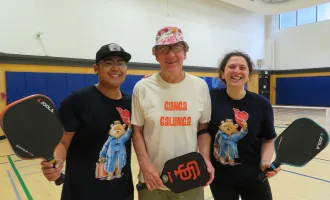This Date in UCSF History: Black Health Education Day
[Originally published in Synapse - The UCSF student newspaper, April 29, 1982] Over 300 high school students, most interested in the field of medicine, attended Black Health Education Day (BHED), April 16, at UCSF. Sponsored by the campus Black Students Health Alliance, the annual all-day program of activities and workshops brings together Bay Area Black high school students and representatives from the four UCSF schools.
The primary purpose is to educate and motivate the high school students toward careers in the health field. By discussing UCSF's curricula and touring the campus the students see how they could fit into a health career setting.
All who attended the April 16 activities benefited merely by being on the campus that day. The workshops comprise the main teaching activity of the day.
This year's instruction covered such areas as Black related diseases, human sexuality, nutrition and the Black community. Workshops also covered the fields of medicine, dentistry, pharmacy, and graduate studies.
Another major focus of the workshops was to provide advice and guidance for college placement since that will be the next step for those who attended Black Health Education Day.
There are many obstacles uniquely facing Black students aspiring to enter health careers or any professional career. Preparation for these obstacles is the best way to deal with them.
Additionally, there are those obstacles everyone must cope with in order to pursue a professional career.
Examinations — such as the SAT, MCAT, OAT, and GRE — filing dates, interviews, and essays, are all part of the process that every college bound student needs to know about well in advance.
We look back on Black Health Education Day not as our one "good-deed-for-the year" but as a forum used to identify the health problems (as well as their economic and political ramifications) that currently face the Black community and to discuss means of individual and group effort to solve these problems; Black Health Education Day was not a day of lecture, rather it was an occasion of sharing and of mutual education.
With that said about what we tried to do, the question remains: Why is it necessary to do it? There are those concerned who contend that affirmative action "came into its own in the 19705."
The fact of the matter is that minority enrollment in medical schools suffered drastically during the '70s. In 1970-71 the UC system had an 11.2 percent Black enrollment in its medical schools. In 1980-81 UC medical schools' Black enrollment was 6 percent, according to the Association of American Medical Colleges, Medical School Admissions Requirements.
The decline is not at all unique to UC. These figures are indicative of a nationwide drop in Black enrollment in professional schools and colleges. From a financial point of view, student aid cutbacks will affect minority students disproportionately since it is minorities who depend most heavily on these programs, and typically the student who comes to Black Health Education Day needs financial aid for college.
Moreover, efforts to rectify physician distribution problems, such as the National Health Service Corps, are being abolished, and with this goes a major vehicle for financing medical education.
These facts, combine with the general and major nemeses of all in need of help. "Reaganomics" means that the picture is constantly changing for future and present students.
Death rates from hypertension, cancer and other diseases which require early detection for treatment is much higher for Blacks than for Whites and this gap is not getting narrower.
So if the question is: "Do we have anything to discuss?" the answer is "evidently, yes." In fact the issues are certainly more than can be handled in a day but a day can make a big difference. Another question I have heard raised is: "Why high school students; why not college students?"
The fact is that there is a lot that a college student could get out of Black Health Education Day, and all of them are welcome to attend. However, the day is mainly for high school students by prearrangement.
The fact is that most Blacks don't go to college, nowadays, most do go to high school. So, we reach the high schools because that's where most Blacks in need of motivation are. If Black Health Education Day 1982 reached anyone at all, it was a success.



